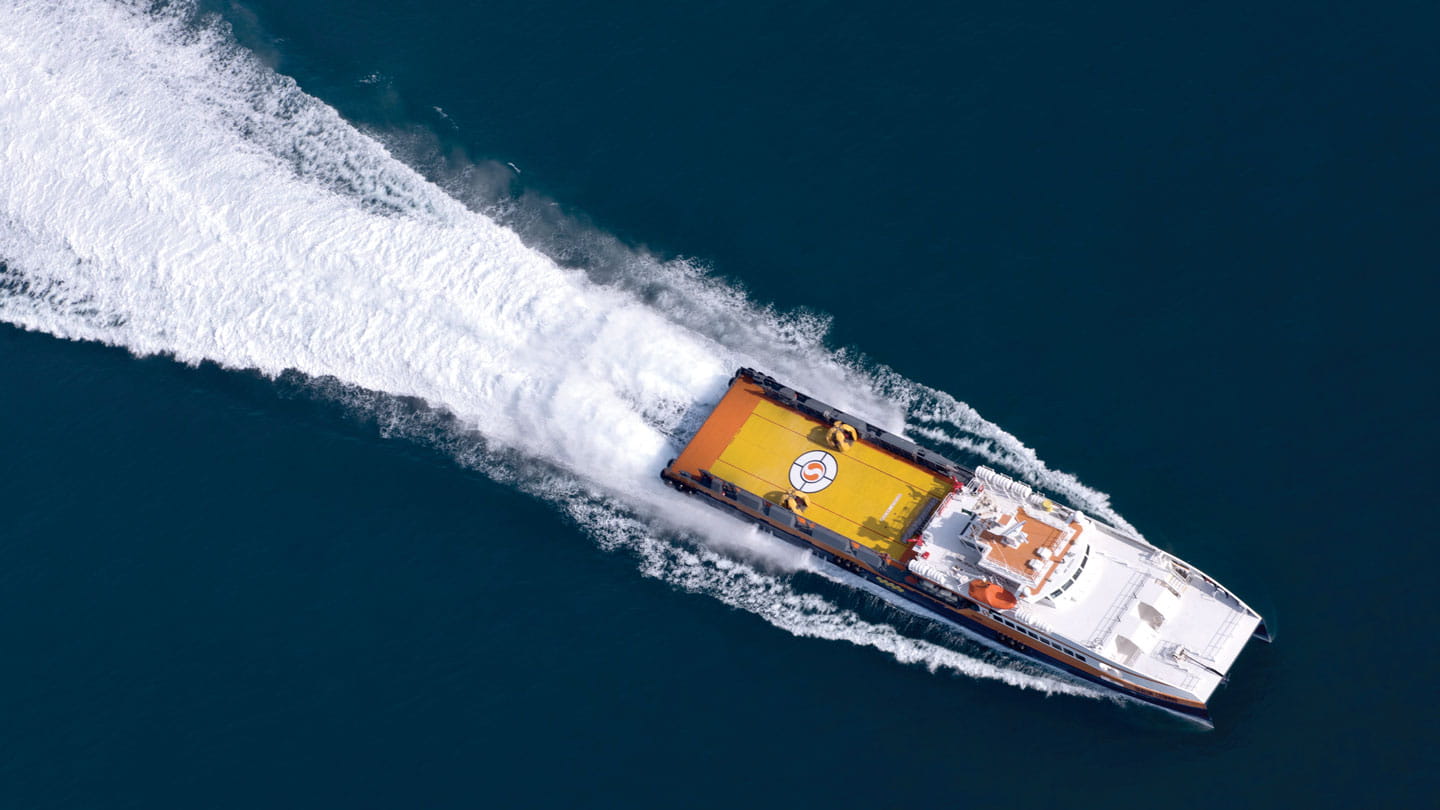Transforming offshore transportation

The Alya McCall transports its passengers and cargo to their next destination in the Tanajib area.
It’s fast, it’s cost-effective, and it has revolutionized the delivery of rig crews working on some of the world’s biggest offshore oil fields.
The new Sea Bus service introduced last year by Saudi Aramco’s Marine Department at Tanajib marks yet another major initiative undertaken as part of an ongoing marine business transformation. The new offshore transportation services follow the successful implementation of the Marine Offshore Floating Hub at Tanajib.
Launched in early 2016, the service uses dedicated Fast Crew Supply Vessels (FCSVs) and has so far exceeded all expectations. The need for the Sea Bus service resulted from the increasing numbers of offshore oil drilling rigs, which raised the demand on our Aviation department to transfer additional rig crews and critical equipment to and from rigs. Crew transfers were previously conducted by helicopter, and this new service is taking a considerable load off of Aviation while also reducing transportation costs.
Among the many benefits of the new program are the cancellation of the procurement of 14 conventional crew boats; a reduction of the load on the helicopter fleet; and a reduction of greenhouse gas emissions due to the reduced number of required vessels.
It is estimated that the program will result in a cost avoidance of about $40 million annually.
After inception of the program in February 2016, more than 45,000 passengers were safely transported from the Tanajib Marine Facility by year-end 2016, with approximately 55,000 passengers per annum expected to be transferred in subsequent years.
Emergency express cargo and critical equipment transfers are also performed on a daily basis to avoid costly rig shutdowns during well-control issues and ensure safe and reliable operations.
The service, which covers the Safaniyah, Manifa, Zuluf, and Marjan oil fields, is an ongoing initiative of the Marine Department’s Logistics Transformation Model that will eventually be rolled out to cover all offshore passenger and equipment transfers. All offshore passenger transfers are centralized at a single point of control, thereby maximizing deployment and availability of the service.
The service’s expansion will eventually include even more offshore customers, such as Northern Area Oil Operations, Terminal Operations, Northern Area Gas Operations, and also the Marine Department’s own vessels and barges.
Young Saudi talent plays a key role
Young Saudi talent is playing a key role in the wider transformation of Marine Logistics operations, particularly the Sea Bus service:
The capabilities of FCSVs
There are currently two FCSVs that are being utilized for the Sea Bus Service — Alya McCall and Seacor Leopard.
Alya McCall
The Alya McCall features a waterjet-propelled monohull design with a top speed of 38 knots, a capacity for 100 passengers, and 327m2 of deck space for cargo. The passenger area has large LCD screens, DVD, WiFi and stabilized satellite television that works anytime on the move.
The vessel has a ride-stabilization system to enhance passenger comfort and is fitted with a DP2 dynamic position system for accurate station keeping alongside rigs.
Additional safety features include FiFi-1 firefighting capability and standby certification (survivor craft).
Seacor Leopard
The Seacor Leopard is a waterjet-propelled catamaran design with a top speed of 42 knots, capacity for 135 passengers, and 260m2 of deck space for cargo. It has a VIP and conference area refreshment center, large LCD screens, DVD, WiFi, and stabilized satellite television.
The vessel has high-tech equipment installed on the bridge for navigating safely at high speeds. The vessel has a ride-stabilization system to enhance passenger comfort and is fitted with a DP3 dynamic positioning system for excellent station keeping alongside rigs. Additional safety features include standby safety certification.
Another step toward excellence
The Marine Department’s Sea Bus initiative is another step-change in the way Saudi Aramco manages offshore oil and gas operations. The latest technologies and equipment have been procured to provide safe, reliable, and efficient offshore transfer services.
The service is successfully managed by a dedicated team of young Saudi dispatchers - a crucial cog in the company’s future. The experience of managing this safety critical aspect of offshore personnel transfer will better equip these future leaders for the challenges that they may one day face.
Media contact information
All media enquiries are handled by Aramco’s Media Communications & Coordination Department, Dhahran, Saudi Arabia.
For media inquiries, please email us at media.inquiries@aramco.com

